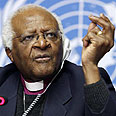
Tutu. Both sides to blame
צילום: AP
Tutu: Palestinians paying for West's Holocaust guilt
Archbishop appointed by UN to investigate Beit Hanoun incident says West is 'feeling contrite, penitent' due to awful crime committed by Nazis, but 'penance is being paid by Palestinians'
Palestinians are paying the price of the West's guilt over the Holocaust through its failure to pressure Israel to reach a just and lasting peace, claims Archbishop Desmond Tutu.
Tutu was appointed by the UN to investigate a fatal shelling incident in the northern Gaza Strip town of Beit Hanoun, in which 19 Palestinians were killed.
"I think the West, quite rightly, is feeling contrite, penitent for its awful connivance with the Holocaust," Tutu told journalists.
"Now when you are contrite, when you are penitent, you are then ready to make amends, and we call that penance. The West is penitent, the penance is being paid by the Palestinians," said the South African archbishop, famed for his anti-apartheid activism.
"I just hope that ordinary citizens in the West will wake up and say, 'we refuse to be part of this'," Tutu added after presenting a report on the shelling Beit Hanoun to the UN Human Rights Council.
His report concluded that "in the absence of a well-founded explanation from the Israeli military... the mission must conclude that there is a possibility that the shelling of Beit Hanoun in 2006 constituted a war crime."
In his address to the Council, Tutu also charged that "the international community is failing to fulfill its role in respect of the suffering of the people of Gaza. It is the silence of the international community in the face of what is happening there which most offends. This silence begets complicity."
Tutu also condemned rocket fire by Palestinian militants based in Gaza against Israeli civilians and said the Islamist Hamas movement in power in the coastal strip was responsible for ensuring it ceased.
"We long desperately for a situation in what many of us call the Holy Land where people can live in peace and in security," Tutu told journalists. But he stressed that "there's not the foggiest chance of peace ever happening until the human rights of all are respected and upheld."










